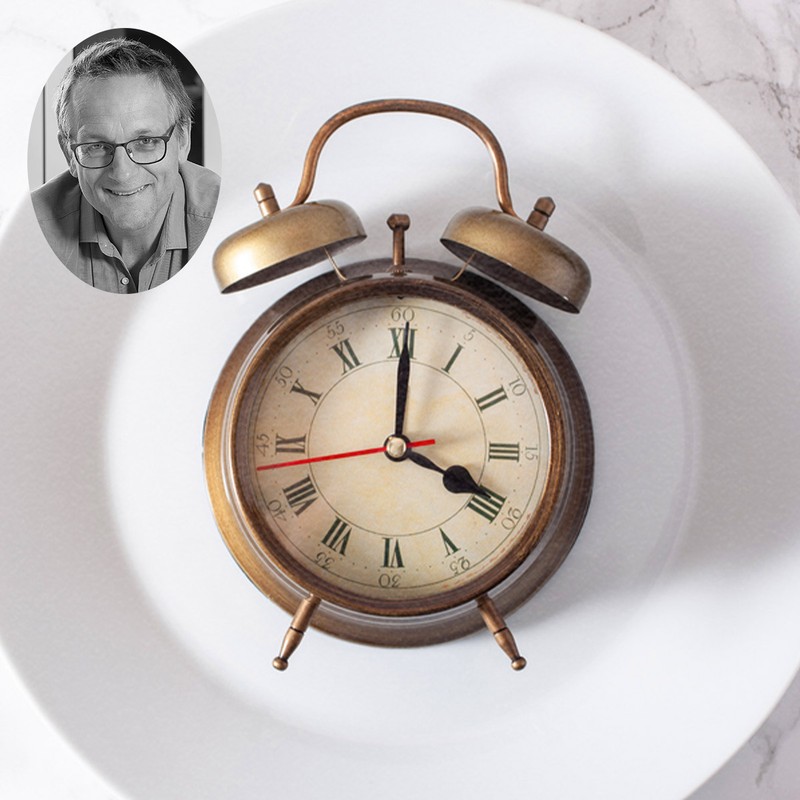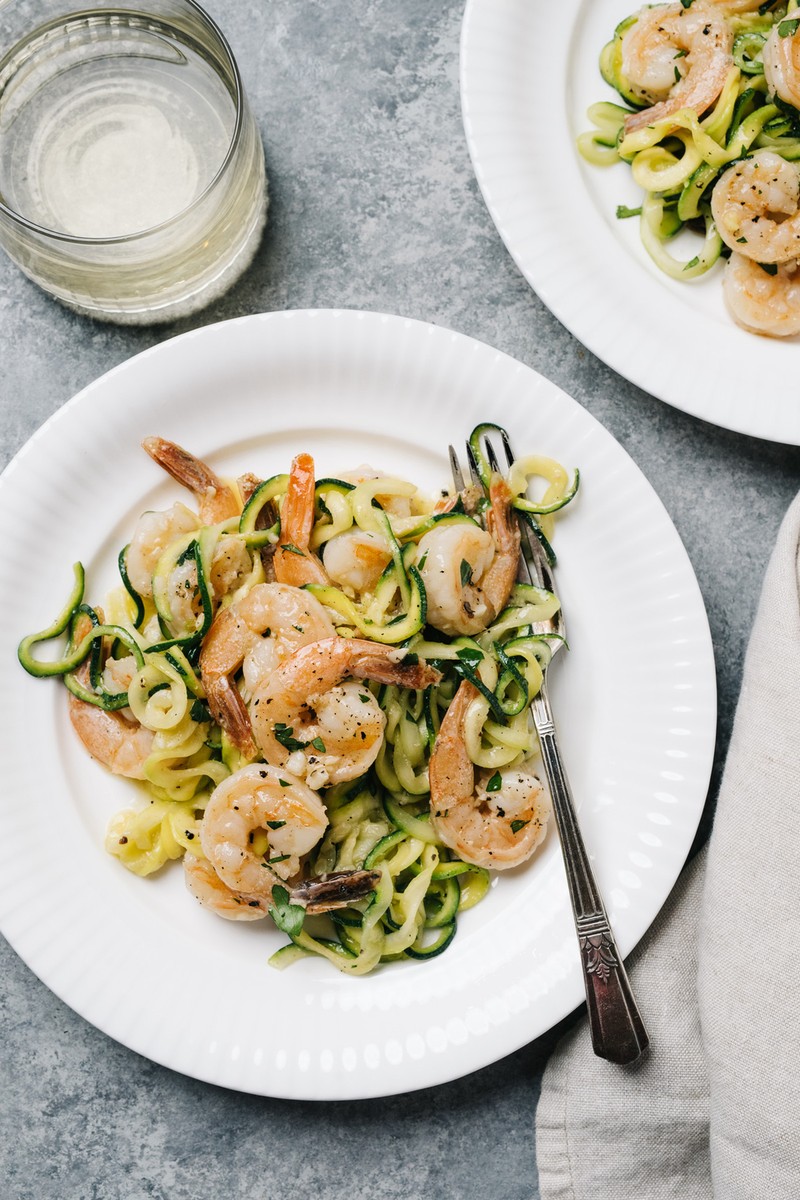

The Creator Of The 5:2 Shares His Diet Secrets
Weight Loss Is Just One Of The Benefits
“When I was diagnosed with type 2 diabetes, I was told it was impossible to get rid of it without medication, so I set out to prove the scientists wrong. I came across some research into intermittent fasting and, while trying it, I invented the 5:2. I lost ten kilos in eight weeks, which was enough to turn my blood sugars to normal, and that’s where they’ve stayed since. As well as accelerating fat loss, when we fast, the body is forced to switch from using glucose as its primary fuel source to delving into our fat stores, which ultimately helps us lose visceral fat, which lurks in and around the abdomen. Fasting also helps us live longer – short-term fasting kickstarts a process within the body called autophagy, whereby dead or worn-out cells are broken down and gobbled up to make way for the shiny, new cells that keep us young. Fasting also appears to reduce the rate at which our bodies produce a specific chemical that accelerates ageing and cancer. It also reduces inflammation, which can aid conditions like arthritis, improve heart health and bolster immunity.”
Energy Levels Will Soar
“Many people expect to feel tired and lethargic if they haven’t eaten for 12 hours or if they only ate 800 calories the day before. But intermittent fasting pushes the body into fat-burning mode and fat is a highly efficient fuel for both your body and brain. This switch makes your metabolism work more efficiently, keeping energy levels stable. At the same time, fasting aids better sleep. Going to bed with a relatively empty stomach enables the internal clock in your digestive system to align with the clock in your brain, so your systems work in tandem to ‘go offline’ for restful sleep. Intermittent fasting also causes levels of melatonin (the sleep-promoting hormone) to rise, which can help you fall asleep faster and stay asleep for longer.”
When You Eat Matters
“Back in the day, the 5:2 meant keeping your calories down to 500 calories a day for a couple of days a week. However, new research shows there are ways to reap the benefits of fasting by eating slightly more calories and condensing the window in which you eat – aka time-restricted eating. Professor Sachin Panda is the chap who kickstarted the research surrounding time-restricted eating, specifically the 14:10 model, meaning you fast for 14 hours overnight and then eat again, but only within a ten-hour window. For example, you might stop eating at 8pm and then not eat until 10am the following day. I follow this way of eating and combining the 5:2 with time-restricted eating is a great way to maximise results.”
Fasting Is Surprisingly Flexible
“Initially, most of the research was done on the consumption of 500-600 calories (500 for women, 600 for men). Today, however, I recommend 800 calories as it’s more sustainable. This is how The Fast 800 was developed. With The Fast 800, we recommend you start consuming roughly 800 calories a day, every day. When you’ve reached your goal weight, move to a 5:2 regime, incorporating five days of eating healthy, Mediterranean-style meals with no calorie restriction but reasonable portion control, alongside two days of 800 calories. If you don’t feel comfortable with 800 calories a day and are struggling with hunger pangs, switch to a 5:2 plan. This is also a good idea if you eat out a lot and want to have days where you don’t count calories. Have two days a week with 800 calories and then eat normally the other five. If night-time snacking is a problem, try time-restricted eating. If you’re new to fasting, your lower-calorie days are likely to need planning to ensure you’re getting the nutrients your body needs. And if you’re following time-restricted eating, know there’s no significant benefit to fasting for longer than 16 hours.”
A Mediterranean-Style Diet Will Enhance Results
“There’s a large body of evidence that shows a Mediterranean-style diet is great for your waistline and physical health. It will cut your risk of heart attack or stroke by around 30%, reduce your risk of developing type 2 diabetes by 50% and slash your risk of breast cancer by 70%. Recent research also shows it’s great for mental health, having a positive effect on mood and helping to ease depression. Fruit, vegetables and legumes form a central part of the Mediterranean diet and these are a good way to boost levels of the good bacteria in your gut. This way of eating will also reduce inflammation in the body, and we know mild inflammation in the brain naturally increases with age, leading to feelings of anxiety, stress, hopelessness and depression. The natural compounds in plant-based foods and oily fish have been shown to reduce this inflammation.”

Breakfast Isn’t Necessarily The Most Important Meal
“One of the most common myths surrounding intermittent fasting is that breakfast is the most important meal of the day – this just isn’t true. In fact, this concept originated as a marketing ploy from cereal brands. Eating breakfast should depend on your schedule and preference. If you’re hungry, a Mediterranean-style breakfast can be beneficial and will keep your blood sugar steady. However, there’s plenty of research to suggest that extending your fasting window (i.e., waiting till later in the day to eat) has plenty of health benefits, including increased weight loss and improving metabolic health.”
The Quality Of Your Calories Matters
“Whether it’s a fasting day or not, the quality of the food on your plate will make a difference to your results. When you eat simple carbs – like white bread and pasta, chips and chocolate – your pancreas immediately releases insulin to mitigate hazardous changes in blood sugar. Insulin is a hormone that helps glucose enter cells so it can be used for energy. However, when cells in your body don’t respond well to insulin, they struggle to take up glucose from your blood, meaning your blood sugar levels stay higher. At the same time, more sugar in your blood encourages the pancreas to make even more insulin – it’s a vicious cycle that can lead to type 2 diabetes. Alternatively, eating foods high in protein, fibre and healthy fats will keep blood sugar steady, encourage you to burn fat and keep you fuller for longer.”
Constant Snacking Is Making You Fat
“A common belief is that spreading out your food into lots of small meals will increase your metabolic rate, but it’s not true. In fact, grazing constantly throughout the day only leads to raised blood sugars and means the body never fully enters a state of fat-burning. The key to weight loss, and intermittent fasting, is eating satiating and nutritious food that will keep you full until your next meal – think a low-carb, Mediterranean-style diet that’s rich in protein, fibre and healthy fat. When you spend time fasting and lowering your carb intake, your glucose supply temporarily runs out and your body has to switch taking fat from your fat stores to burn as fuel.”
Fasting Doesn’t Put The Body Into Starvation Mode
“The idea that fasting slows your metabolism is a myth. In fact, the opposite is true. When you’re in a calorie deficit – say, in this case, 800 calories per day or less – not only do you lose weight, but your body responds to the stress of fasting by enhancing hormone function to facilitate weight loss and burn fat for energy. Fasting kickstarts several processes in the body that make fat-burning easier.”
It's Important To Stay Active
“Many studies have shown the benefits of combining high intensity training (HIIT) with resistance training. The theory behind this is that these two forms of exercise together create an optimal environment to maximise fat loss while maintaining muscle mass. And don’t believe the hype about exercising on an empty stomach, as studies show the benefits are marginal. Experiment with different approaches, such as exercising during your eating window or non-fasting days to find what works for you.”
For more from Dr Michael Mosley or to sign up to The Fast 800, visit TheFast800.com, where you can access the new app.
DISCLAIMER: Features published by SheerLuxe are not intended to treat, diagnose, cure or prevent any disease. Always seek the advice of your GP or another qualified healthcare provider for any questions you have regarding a medical condition, and before undertaking any diet, exercise or other health-related programme.
DISCLAIMER: We endeavour to always credit the correct original source of every image we use. If you think a credit may be incorrect, please contact us at info@sheerluxe.com.

